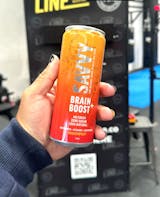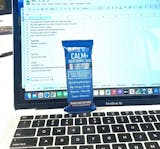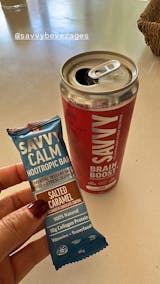
Alpha-GPC, (Alpha-glycerophosphocholine) is a compound made up of choline and glycerophosphate with neuroprotective activity. Alpha-GPC is a cholinergic compound that prevents cognitive decline, and increases attention and memory.
Alpha GPC contributes to improved memory formation and learning. Acetylcholine is utilised by the hippocampus to create memories. Many studies suggest that alpha GPC can actually be an effective attention / focus enhancer as well.
|
Alpha GPC Fast Facts
|
- Enhances Memory, learning, and focus by increasing acetylcholine.
- Improves strength, power, and growth hormone release.
- Easily crosses the blood-brain barrier for fast effects.
- Shields brain cells and aids recovery from cognitive decline.
- Naturally derived from cell membranes and choline-rich foods.
|
Amount used: 100mg
Active ingredient: Alpha-glycerylphosphorylcholine
Why: Alpha GPC greatly increased many benefits to mental performance through concentration, sustained attention, focus and working memory. 100mg is sufficient to help with these benefits.
ALPHA-GPC CHOLINE SOURCES

Main benefits for Savvy:
- Helps improve cognitive performance
- Improved concentration, sustained attention, focus and working memory
- Increases mental and physical performance and reaction time
- Neuroprotective benefits
To make it easy to identify all the different studies - we will highlight them for you!
We really hope you enjoy our many years of research when formulating Savvy...

Helps improve cognitive performance
Meck, WH and Williams CL, ‘Metabolic imprinting of choline by its availability during gestation: implications for memory and attentional processing across the lifespan.’ in Neuroscience and Biobehavioral Reviews, Volume 27, Issue 4, September 2003, pp 385 - 399. [Link]
“A growing body of research supports the view that choline is an essential nutrient during early development that has long-lasting effects on memory and attentional processes throughout the lifespan...Choline supplementation during this period increases memory capacity and precision of the young adult and appears to prevent age-related memory and attentional decline.”
Gatti, G, et al, ‘A comparative study of free plasma choline levels following intramuscular administration of L-alpha-glycerylphosphorylcholine and citicoline in normal volunteers.’ in International Journal of Clinical Pharmacology, Therapy and Toxicology, Volume 30, Issue 9, September 1992, pp 331 - 335. [Link]
“L-alpha-glycerylphosphorylcholine (alpha-GPC) is a recently developed cognitive enhancer whose mode of action is considered to involve the release of free choline, which is then utilized for acetylcholine and phosphatidylcholine biosynthesis in the brain…”
Skripuletz, T, et al, ‘Pivotal role of choline metabolites in remyelination.’ in Brain, Volume 138, Pt 2, February 2015, pp 398 - 413. [Link]
“We thus identified a new mechanism to enhance central nervous system remyelination via the choline pathway.”
Klein, J, et al, ‘Free choline and choline metabolites in rat brain and body fluids: sensitive determination and implications for choline supply to the brain.’ in Neurochemistry International, Volume 22, Issue 3, March 1993, pp 293 - 300. [Link]
“We concluded that the transport of free choline is the only likely mechanism which contributes to the supply of choline to the brain under physiological conditions.”
The above study infers that only free choline, usually by supplementation, contributes to additional benefits of choline.
Schettini, G, et al, ‘Molecular mechanisms mediating the effects of L-alpha-glycerylphosphorylcholine, a new cognition-enhancing drug, on behavioral and biochemical parameters in young and aged rats.’ in Pharmacology, Biochemistry, and Behavior, Volume 43, Issue 1, September 1992, pp 139 - 151. [Link]
“The behavioral effects of the acute and subchronic administration of L-alpha-glycerylphosphorylcholine (alpha-GPC) on passive and active avoidance behavioral tasks were investigated. When administered IP after training together with scopolamine 2 h before retest, alpha-GPC reverses the scopolamine-induced amnesia in the passive avoidance conditioning in young and old rats. Furthermore, the subchronic treatment with alpha-GPC positively and significantly influences the performance of both young and old animals in the active avoidance test.“
Brownawell, AM, et al, ‘Safety assessment of AGPC as a food ingredient.’ in Food and chemical toxicology: an international journal published for the British Industrial Biological Research Association, Volume 49, Issue 6, June 2011, pp 1303 - 1315. [Link]
“α-Glycerylphosphorylcholine (AGPC) is a semi-synthetic derivative of lecithin. Following oral administration, it is converted to phosphatidylcholine, a metabolically active form of choline that is able to reach cholinergic synaptic endings where it increases acetylcholine synthesis and release”
Mec, WH and Williams CL, ‘Choline supplementation during prenatal development reduces proactive interference in spatial memory.’ in Brain Research. Developmental Brain Research, Volume 118, Issues 1-2, December 1999, pp 51 - 59. [Link]
“Previous research has demonstrated that increasing dietary choline during early development can have long-lasting effects on cholinergic (Ch) function that are correlated with improvement of spatial memory ability....”
Di Perri, R, et al, ‘A multicentre trial to evaluate the efficacy and tolerability of alpha-glycerylphosphorylcholine versus cytosine diphosphocholine in patients with vascular dementia’ in The Journal of International Medical Research, Volume 19, Issue 4, July 1991, pp 330 - 341. [Link]
“Both treatments produced a definite symptomatic improvement and showed a very good tolerability. The results suggest that in most tests alpha-GPC possessed a statistical higher efficacy and an overall more satisfactory activity assessed by both patients and investigators compared with CDP”
McGlade, E, et al, ‘Improved Attentional Performance Following Citicoline Administration in Healthy Adult Women’ in Scientific Research, Volume 3, Issue 6, June 2012, pp 769 - 773. [Link]
“After 28 days of daily citicoline supplementation, participants who were administered ... doses showed significantly better ability to produce correct responses on the CPT-II, likely due to improved cognitive inhibition. Our findings suggest that citicoline may improve attentional performance in middle-aged women and may ameliorate attentional deficits associated with central nervous system disorders.”

Improved concentration, sustained attention, focus and working memory
Bruce, SE, ‘Improvements in concentration, working memory and sustained attention following consumption of a natural citicoline-caffeine beverage.’ in International Journal of Food Sciences and Nutrition, Volume 65, Issue 8, December 2014, pp 1003 - 1007. [Link]
“This study examined the neurocognitive and electrophysiological effects of a citicoline-caffeine-based beverage in 60 healthy adult participants enrolled in a randomized, double-blind, placebo-controlled trial. Measures of electrical brain activity using electroencephalogram (EEG) and neuropsychological measures examining attention, concentration and reaction time were administered… Overall, these findings suggest that the beverage significantly improved sustained attention, cognitive effort and reaction times in healthy adults. Evidence of improved P450 amplitude indicates a general improvement in the ability to accommodate new and relevant information within working memory and overall enhanced brain activation.”
Bruce, S, ‘Improvements in quantitative EEG following consumption of a natural citicoline-enhanced beverage’ in International Journal of Food Sciences and Nutrition, Volume 63, Issue 4, 2012 pp 421 - 425. [Link]
“These preliminary findings suggest that a novel brain drink containing compounds known to increase choline in the brain significantly improved attention as measured by ERP and EEG.”
Trabucchi, M, et al, ‘Changes in the interaction between CNS cholinergic and dopaminergic neurons induced by L-alpha-glycerylphosphorylcholine, a cholinomimetic drug.’ in Farmaco, Edizione Scientifica, Volume 41, Issue 4, April 1986, pp 325 - 334. [Link]
“...the in vivo cholinergic activity might be due to the fact that this drug may increase the availability of choline for acetylcholine synthesis leading to increased acetylcholine production.”
Sigala, S, et al, ‘L-alpha-glycerylphosphorylcholine antagonizes scopolamine-induced amnesia and enhances hippocampal cholinergic transmission in the rat.’ in European journal of pharmacology, Volume 211, Issue 3, February 1992, pp 351 - 358. [Link]
“The data suggest that the behavioural effects of alpha-GPC may be related to its property to increase hippocampal ACh synthesis and release.”
The above study shows that alpha GPC has a strong effect on increasing brain acetylcholine, which has many positive effects on the brain.
Amenta, F, et al, ‘Association with the cholinergic precursor choline alphoscerate and the cholinesterase inhibitor rivastigmine: an approach for enhancing cholinergic neurotransmission.’ in Mechanisms of aging and development, Volume 127, Issue 2, February 2006, pp 173 - 179. [Link]
“These data suggest that combination of a suitable precursor of brain acetylcholine such as choline alphoscerate and of a cholinesterase inhibitor may represent an association worthwhile of being further investigated as a cholinergic replacement therapy in pathologies characterized by altered cholinergic neurotransmission.”
Tayebati, SK, et al, ‘Modulation of monoaminergic transporters by choline-containing phospholipids in rat brain.’ in CNS & neurological disorders drug targets, Volume 12, Issue 1, February 2013, pp 94 - 103. [Link]
“The above data indicate that CDP-choline and GPC possess a monoaminergic profile and interfere to some extent with brain monoamine transporters.”
The above study indicates that A-GPC possesses a monoaminergic profile, they co directly modulate the serotonin, dopamine, norepinephrine, epinephrine, and/or histamine neurotransmitter systems in the brain.
Poly, C, et al, ‘The relation of dietary choline to cognitive performance and white-matter hyperintensity in the Framingham Offspring Cohort 1,2,3,4’ in The American Journal of Clinical Nutrition, Volume 94, Issue 6, December 2011, pp 1584 - 1591. [Link]
“In this community-based population of nondemented individuals, higher concurrent choline intake was related to better cognitive performance”

Increases mental and physical performance and reaction time
Zeigenfuss, T, et al, ‘Acute supplementation with alpha-glycerylphosphorylcholine augments growth hormone response to, and peak force production during, resistance exercise’ in Journal of the International Society of Sports Nutrition, Volume 5, Supplement 1, 2008. [Link]
“One ingredient that has shown clinical promise in elevating GH is the acetylcholine precursor alpha-glycerylphosphorylcholine (A-GPC). The purpose of this study was to examine the effects of a supplement containing primarily A-GPC on serum GH levels, explosive performance, and post-exercise substrate oxidation...Compared to baseline (pre) values, peak GH increased 44-fold during A-GPC... Peak bench press force was 14% greater in A-GPC... Trends toward higher peak bench press power (P < 0.13) and lower post-exercise RER (P < 0.12) were noted in the A-GPC trial.”
Kawamura, T, et al, ‘Glycerophosphocholine enhances growth hormone secretion and fat oxidation in young adults.’ in Nutrition, Volume 28, Issue 11 and 12, November and December 2012, pp 1122 - 1126. [Link]
“These findings suggest that a single dose of GPC increases growth hormone secretion and hepatic fat oxidation, with concomitant increases in choline levels, in young adults.”
Scapicchio, PL, ‘Revisiting choline alphoscerate profile: a new, perspective, role in dementia?’ in The International Journal of Neuroscience, Volume 123, Issue 7, July 2013, pp 444 - 449. [Link]
“Choline alphoscerate (alpha-glyceryl-phosphorylcholine, alpha-GPC) is a semisynthetic derivative of phosphatidylcholine with central parasympathomimetic action. This action is, on the basis of its use in pathologies, characterized by cognitive deficits of neurodegenerative or vascular nature. In a number of clinical studies, alpha-GPC demonstrated benefit in patients with cognitive dysfunction. “
Hoffman, JR, et al, ‘The effects of acute and prolonged CRAM supplementation on reaction time and subjective measures of focus and alertness in healthy college students.’ in Journal of the International Society of Sports Nutrition, Volume 7, issue 39, December 2010. [Link]
“Results indicate that acute ingestion of CRAM can maintain reaction time, and subjective feelings of focus and alertness to both visual and auditory stimuli in healthy college students following exhaustive exercise… The purpose of this study was to examine the effect of acute and prolonged (4-weeks) ingestion of a supplement designed to improve reaction time and subjective measures of alertness, energy, fatigue, and focus...CRAM; α-glycerophosphocholine, choline bitartrate, phosphatidylserine, vitamins B3, B6, and B12, folic acid, L-tyrosine, anhydrous caffeine, acetyl-L-carnitine, and naringin… Reaction time significantly declined.”

Neuroprotective Benefits
Tayebali, SK, et al, ‘Neuroprotective effect of treatment with galantamine and choline alphoscerate on brain microanatomy in spontaneously hypertensive rats.’ in Journal of the Neurological Sciences, Volume 283, Issue 1 and 2, August 2009, pp 187 - 194. [Link]
”This study confirms a neuroprotective effect of galantamine in SHR and indicates a neuroprotective role of choline alphoscerate in the same model. A wider neuroprotective effect of the cholinergic inhibitor/precursor association was observed.”
Tayebati, SK and Amenta F, ‘Choline-containing phospholipids: relevance to brain functional pathways.’ in Clinical Chemistry and Laboratory Medicine, Volume 51, Issue 3, March 2013, pp 513 - 521. [Link]
“We provide evidence in favor of CDP-choline and GPC activity in cerebrovascular or neurodegenerative disorders characterized by cholinergic neurotransmission impairment. “
Klein, J, ‘Membrane breakdown in acute and chronic neurodegeneration: focus on choline-containing phospholipids.’ in Journal of Neural Transmission (Vienna, Austria)< Volume 107, Issue 8 and 9, 2000, pp 1027 - 1063. [Link]
“The finding that, in experimental studies, choline was a rate-limiting factor for phospholipid biosynthesis has stimulated clinical studies aimed at counteracting phospholipid breakdown, e.g. by combinations of choline and cytidine.”
Amenta, F, et al, ‘Association with the cholinergic precursor choline alphoscerate and the cholinesterase inhibitor rivastigmine: an approach for enhancing cholinergic neurotransmission.’ in Mechanisms of Aging and Development, Volume 127, Issue 2, February 2006, pp 173 - 179. [Link]
“Choline alphoscerate or rivastigmine alone or in association, but not choline increased acetylcholine immunoreactivity in nerve fibers supplying cerebral cortex. These data suggest that combination of a suitable precursor of brain acetylcholine such as choline alphoscerate and of a cholinesterase inhibitor may represent an association worthwhile of being further investigated as a cholinergic replacement therapy in pathologies characterized by altered cholinergic neurotransmission.”










